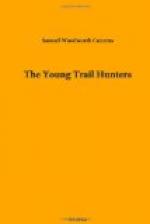Now I had always wanted to kill a black-tailed deer, and this was the first time I had ever seen one, so I begged Nat to let me shoot it.
He said, with a laugh, “Shoot away!” and I took deliberate aim and fired.
“Ha! ha! ha!” roared he, as the fellow bounded away unharmed, “it’s as clear a case of ‘buck-fever’ as ever I saw.”
“Not at all. I aimed too high; that was the only trouble.”
“Jest so,” replied Nat; “a man with the ‘fever’ always aims too high.”
“I’ll bet I won’t miss the next one,” said I, angry at the imputation.
“I’ll bet you will, two to one on it,” said Nat. “But it’s too late to get another shot to-night, so we’ll wait until to-morrow evening; and, in the mean time, I’ll give you a few idees ’bout deer.”
“As soon as the sun had sunk to his rest the next evening, I borrowed Nat’s ‘call’ and started out.”
“What’s a ’call’?” inquired Ned.
“A ‘call’ is a whistle, made from an eagle’s bone. It is generally fancifully carved, and, when sounded, makes a noise that perfectly resembles that made by a young one in calling its mother. So perfect is the imitation of the bleating of a fawn, that, when properly sounded, you will sometimes see half a dozen does, running to see if their young are in danger.”
“But don’t they stay with their little ones?” asked Hal.
“No: they hide them in the tall grass at night. You see a fawn gives out no scent until after it’s a month old, and can run well; but the old one does, and knowing this she goes off to sleep alone, so that the wolves and panthers won’t be attracted by her scent to the fawn. This she continues doing until the fawn is able to protect itself by running. In the fall of the year, therefore, if you select a spot near the foot of a mountain where the grass is tall and free from bushes, and, between sundown and dark, conceal yourself in it and sound your call, you are very apt to get a choice between four or five good fat doe’s.”
Well, I was determined to get a deer; so I borrowed the ‘call,’ and started out. After walking a mile or two, I came to a beautiful stretch of open prairie, where the tall grass served admirably for concealment.
I lay down upon my belly, and commenced crawling towards a grove of young cedars, near the base of the mountain.
I very soon discovered that propelling myself along, Indian fashion, with my elbows, was of itself no small job, especially when obliged to carry a rifle and keep my head below the level of the grass about me.
I persevered however, and after working like a beaver for nearly an hour, began to wonder why I did not see any deer, when all at once it occurred to me, that I hadn’t sounded the call; and that made me remember, that I had forgotton in which pocket I put it.
I endeavored for some time to get hold of it, but was finally obliged to roll over upon my back before I could fish it out of the depths of my pantaloons pocket. This was easy enough to do, but to resume my former position without betraying my presence—ah! that was another thing. I eventually succeeded in doing it however, and placing the whistle between my lips, put forth my hand to recover my rifle, when, to my horror and dismay, I saw, within four feet of my face, a huge rattlesnake.




